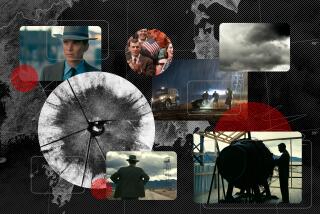A SUNDAY IN DECEMBER : Viewpoints East and West : ‘Like Huge Mass Murder’
- Share via
SHELDON ASHLEY:
” The attack, of course, was a shock--like a huge mass murder. . . . If I had to sum up how I felt at that moment about what the Japanese did, the first word would be ‘murderers’ and the second word would have to be ‘revenge.’ . . .
“I don’t think that prior to Pearl Harbor, I’d seen even one Japanese restaurant in New York. I knew historically of the Japanese, the imperialistic moves they made, the China and Mongolia adventures, and so forth. But . . . we were sort of distant. The U.S. was still in sort of an isolationist mood. . . .
“The price of maintaining an adequate defense is high, of course, but the price of neglecting it is worse. Chaos is possible. Humiliation’s possible. Defeat’s possible. Picture us if the U.S. did not have the technology for neutralizing Iraq’s intentions toward Kuwait. . . .
“I don’t think that (the Japanese) are innovators; copiers perhaps, but not innovators. I think they’ve either topped out (as an economic powerhouse) or are very close to being topped out. I have suspicions that our real rivals will be Germany rather than Japan because the Germans have the ability to assume the technological initiative that the Japanese never will. . . .
“I think it’s a necessity that the Japanese and the U.S. find some way to resolve their economic differences and become partners in the global economy. . . . The American public was rather slow to recognize the fact that we had a competitor in the form of the Japanese. But America and its very good ingenuity should be able to cope with that. It’s going to be a very difficult task, though.”
KAORU TOGO:
” I don’t know clearly why Japan attacked the United States, but it was probably because Japan’s ambitions were so strong that it thought it could win any war. . . . I never heard a thing (about Pearl Harbor) from my parents. It was mentioned in about three lines in textbooks as the beginning of the war. That’s all the knowledge I have about it. . . .
“In my education, I thought the facts that were presented represented what happened . . . But looking back, I do think there were distortions in (our) textbooks. Newspapers have reported the dispute over the use of the words advance or aggression, and that only things favorable to Japan (were included). . . .
“There is no use even trying to begin to discuss the bad things at this point. . . The present emperor went to Southeast Asia and made a more or less apologetic statement. . . . Given the fact that the emperor is apologizing, what are we supposed to do beyond that? . . .
“Japan’s economy grew with a constitution that was decided upon by American leadership. In principle, the U.S. operated on the theory that wherever products might come from, it was all right. But . . . whether it be autos or electronics, Japanese technological power is putting pressure on American industries. When America was strong, it said nothing. But now that it has become somewhat weak, it is complaining about many things.
“America thinks it is No. 1. And if it isn’t, it can’t stand it. America has that tendency. Because Japan has become No. 1 economically, the United States is showering complaints upon us. . . .”
More to Read
Sign up for Essential California
The most important California stories and recommendations in your inbox every morning.
You may occasionally receive promotional content from the Los Angeles Times.













